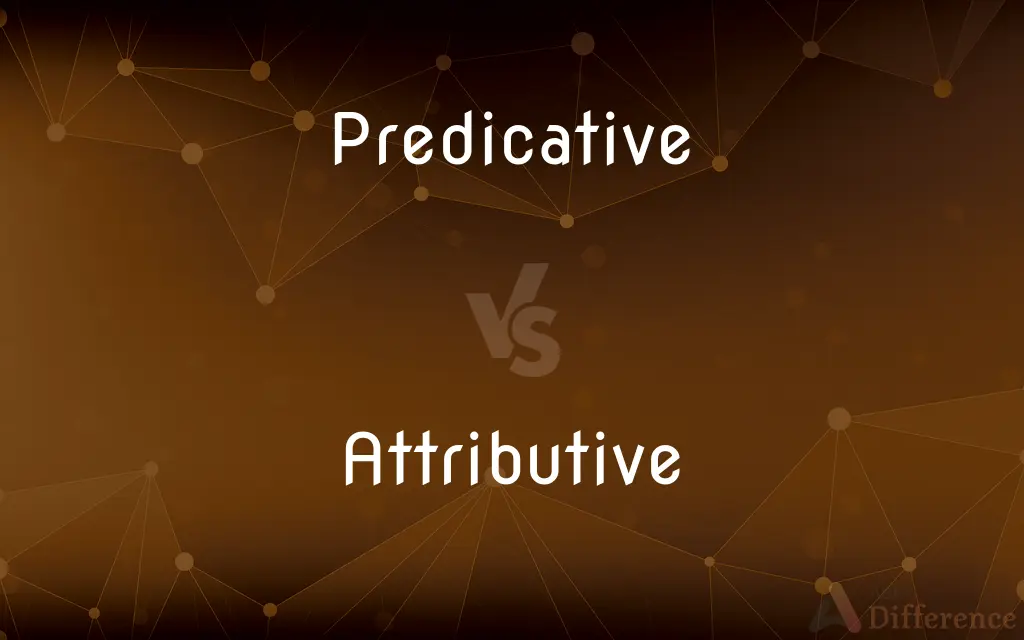Predicative vs. Attributive — What's the Difference?
By Fiza Rafique & Maham Liaqat — Updated on April 4, 2024
Predicative adjectives are used after a verb to describe a subject, while attributive adjectives directly modify a noun before it appears in a sentence.

Difference Between Predicative and Attributive
Table of Contents
ADVERTISEMENT
Key Differences
Predicative adjectives come into play in the structure of a sentence where they are positioned after a linking verb (such as "be," "seem," "become") and serve to describe or modify the subject of the sentence. For instance, in the sentence "The sky is blue," "blue" is a predicative adjective describing "sky." On the other hand, attributive adjectives precede the noun they describe and are directly attached to their nouns to modify them. In the example "The blue sky stretches overhead," "blue" is an attributive adjective modifying "sky."
One of the distinguishing features of predicative adjectives is their ability to complement the subject by providing additional information or qualifying it in some way, often in relation to the verb. Attributive adjectives, however, are integral to the noun phrase, giving essential information that defines or limits the noun before the verb action is considered. This positioning can affect the emphasis and rhythm of a sentence, as well as the specificity of the description provided.
Predicative positions allow for the use of adjectives that cannot typically be used attributively. For example, "afraid" can be used predicatively as in "She is afraid," but it is not standard to use "afraid" attributively in front of a noun (*"an afraid person" is less common). Similarly, certain adjectives are primarily or exclusively used attributively, such as "utter" in "an utter disaster," and sound awkward or are rarely used in a predicative position.
Both forms play crucial roles in English syntax and style. Predicative adjectives are key in stating qualities, conditions, or states being assigned to the subject, often in relation to the action of the verb. Attributive adjectives, meanwhile, allow for more concise and immediate characterization of the noun, contributing to more dynamic and descriptive narrative styles.
The choice between using a predicative or attributive adjective can also depend on the specific adjective and the context of the sentence. Some adjectives change meaning depending on their position. For example, "The teacher is responsible" (predicative) suggests the teacher has responsibility, whereas "the responsible teacher" (attributive) might imply the teacher is characterized by responsible behavior, possibly distinguishing them from others.
ADVERTISEMENT
Comparison Chart
Position in Sentence
Follow a linking verb
Precede the noun they modify
Function
Describe or modify the subject in relation to the verb
Directly modify and are integral to the noun phrase
Usage Examples
"The flowers are beautiful."
"The beautiful flowers bloom."
Adjective Types
Can be used with a broader range of adjectives, including those not typically used before nouns
Primarily uses adjectives that can precede nouns
Effect on Meaning
Can change the adjective’s impact based on its relationship with the verb
Defines or limits the noun before the action of the verb
Compare with Definitions
Predicative
Adjectives that describe the subject following a linking verb.
The cake tastes delicious.
Attributive
Adjectives that directly modify a noun before it.
The green grass covers the hill.
Predicative
Used to indicate the state or condition of the subject.
The room is spacious.
Attributive
Integral to building the noun phrase.
A noisy crowd gathered.
Predicative
Can often include adjectives not used before nouns.
She is afraid of the dark.
Attributive
Can determine or specify particular qualities of the noun.
The ancient manuscript was found.
Predicative
Provides additional information about the subject post-verb.
The results seem unfair.
Attributive
Often used to create a specific, immediate impression of the noun.
The sparkling water reflected the sun.
Predicative
Focuses on the relationship between the subject and its state or quality.
The solution was incorrect.
Attributive
Placed directly before the noun to define or limit it.
The final score was surprising.
Predicative
To base or establish (a statement or action, for example)
I predicated my argument on the facts.
Attributive
A word or word group, such as an adjective, that is placed adjacent to the noun it modifies without a linking verb; for example, pale in the pale girl.
Predicative
To state or affirm as an attribute or quality of something
The sermon predicated the perfectibility of humankind.
Attributive
(Grammar) Of, relating to, or being an attributive, as an adjective.
Predicative
To carry the connotation of; imply.
Attributive
Of or having the nature of an attribution or attribute.
Predicative
(Logic) To make (a term or expression) the predicate of a proposition.
Attributive
Modifying another word, typically a noun, while in the same phrase.
In "this big house", "big" is attributive, whereas in "this house is big", it is predicative.
In "this tiger is a man-eater," "man" is an attributive noun.
Predicative
To proclaim or assert; declare.
Attributive
Attributing; characterized by attributing; effecting attribution.
Predicative
To make a statement or assertion.
Attributive
(grammar) An attributive word or phrase (see above), contrasted with predicative or substantive.
In "this big house," "big" is an attributive, while in "this house is big," it is a predicative.
Predicative
(Grammar) One of the two main constituents of a sentence or clause, modifying the subject and including the verb, objects, or phrases governed by the verb, as opened the door in Jane opened the door or is very sleepy in The child is very sleepy.
Attributive
Attributing; pertaining to, expressing, or assigning an attribute; of the nature of an attribute.
Predicative
(Logic) That part of a proposition that is affirmed or denied about the subject. For example, in the proposition We are mortal, mortal is the predicate.
Attributive
A word that denotes an attribute; esp. a modifying word joined to a noun; an adjective or adjective phrase.
Predicative
(Grammar) Of or belonging to the predicate of a sentence or clause.
Attributive
Of adjectives; placed before the nouns they modify;
`red' is an attributive adjective in `a red apple'
Predicative
Stated or asserted; predicated.
Predicative
Modifying a noun while in a predicate phrase, which predicate phrase is other than the noun phrase and occurs after a verb, as a predicate; contrasted with attributive.
In the sentence, ‘This house is big’, ‘big’ is predicative, whereas in ‘This is a big house’, it is attributive.
Compound adjectives are typically hyphenated in attributive position (for example, 'a high-quality scan is a must'), whereas in predicative position, many house styles specify open styling (for example, 'this scan is high quality.'
Predicative
(grammar) An element of the predicate of a sentence which complements the subject or object by means of the verb. Predicatives may be nominal or adjectival.
Predicative
(grammar) In some languages, a special part of speech used as a predicate and denoting a state of being.
Predicative
Expressing affirmation or predication; affirming; predicating, as, a predicative term.
Predicative
Of adjectives; relating to or occurring within the predicate of a sentence;
`red' is a predicative adjective in `the apple is red'
Common Curiosities
Are there adjectives that exclusively function in a predicative position?
Yes, adjectives like "afraid" are typically used in a predicative position because they describe a state or condition of the subject rather than directly modifying the noun.
Can the use of attributive adjectives affect sentence clarity?
Yes, attributive adjectives can provide essential information that defines or specifies a noun, making the sentence meaning clearer and more precise.
How does the position of an adjective affect the meaning of a sentence?
The position can change the emphasis and sometimes the meaning. Predicative adjectives often describe states or conditions, while attributive adjectives define or limit the noun.
How do predicative adjectives relate to linking verbs?
Predicative adjectives need a linking verb to connect them to the subject they describe, indicating the subject’s state, condition, or quality in relation to the verb.
Can the choice between predicative and attributive positions affect the tone or style of writing?
Yes, the choice can significantly affect tone and style. Attributive adjectives can make prose more descriptive and compact, while predicative adjectives can make statements feel more deliberate, affecting the pacing and rhythm of writing.
Are there exceptions to the general placements of predicative and attributive adjectives?
Certain adjectives can be used flexibly in both positions without changing the meaning significantly, but some adjectives have fixed positions due to their meanings, usage patterns, or grammatical conventions.
Can all adjectives be used both predicatively and attributively?
No, some adjectives are primarily used in one position due to their meanings or conventional usage patterns.
Do predicative and attributive adjectives follow the same grammatical rules?
Predicative and attributive adjectives follow different rules regarding their placement in a sentence, but they share general adjective agreement rules concerning number, degree, and comparison.
How does the distinction between predicative and attributive adjectives impact language learning?
Understanding this distinction helps language learners grasp sentence structure and the nuances of adjective placement, which can influence meaning and clarity in communication.
In what ways can the context of a sentence dictate the use of an adjective as predicative or attributive?
The intended meaning, emphasis, or stylistic choice of a sentence can dictate the use. Predicative adjectives are chosen for emphasis on the state or condition related to the verb, while attributive adjectives are selected for immediate, inherent qualities of the noun, often to distinguish it from others within the same context.
Is it possible for an adjective to change its form when moving from attributive to predicative position?
While most adjectives do not change form, the implication or perceived meaning of the adjective can shift based on its position in the sentence.
Share Your Discovery

Previous Comparison
Drowning vs. Swimming
Next Comparison
Snowboarding vs. SkateboardingAuthor Spotlight
Written by
Fiza RafiqueFiza Rafique is a skilled content writer at AskDifference.com, where she meticulously refines and enhances written pieces. Drawing from her vast editorial expertise, Fiza ensures clarity, accuracy, and precision in every article. Passionate about language, she continually seeks to elevate the quality of content for readers worldwide.
Co-written by
Maham Liaqat














































